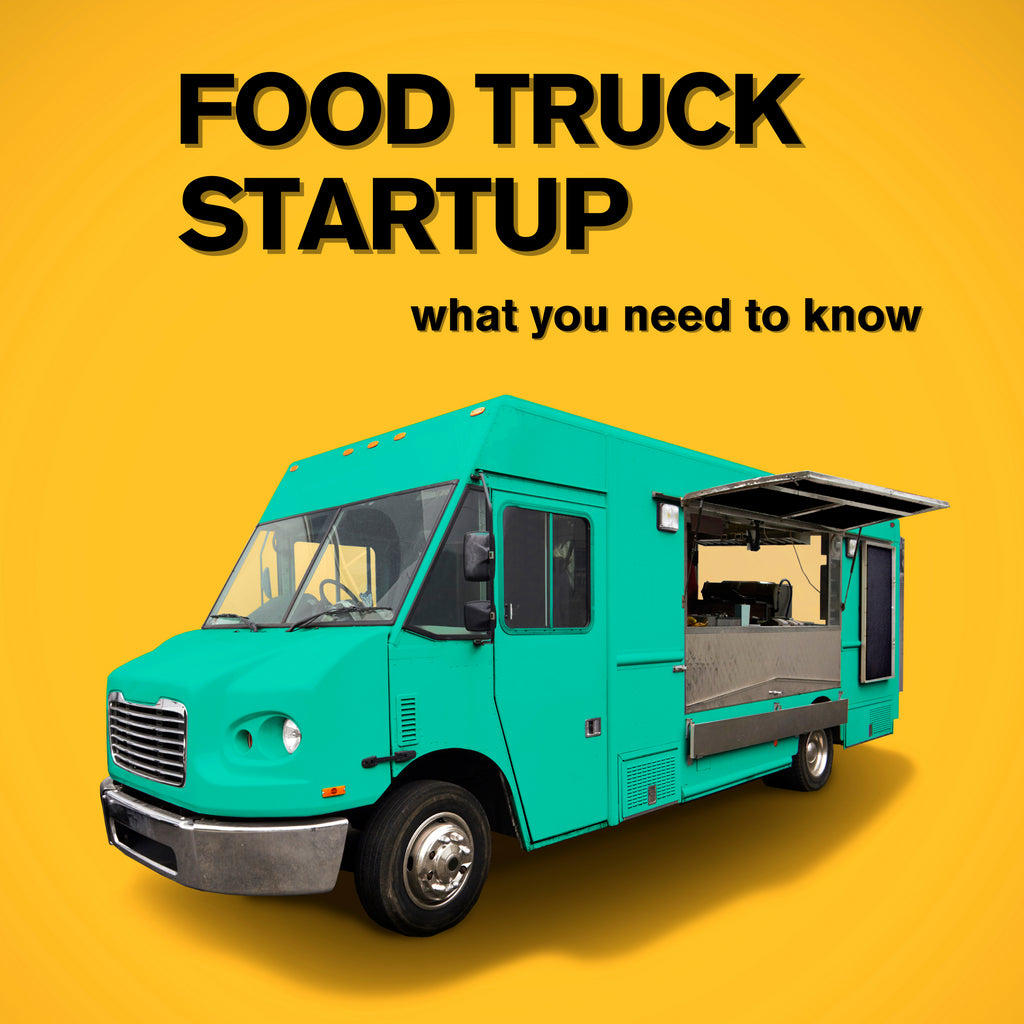Food Truck Startup
Posted by JENNIFER TUMILTY

If you’re reading this, chances are you’re thinking of starting a food truck business. Congratulations on your decision to investigate the wonderful world of small business ownership. There’s a lot of good reasons to go this route.
If you’re eager to open a restaurant, the price of buying, renting, or leasing a brick-and-mortar venue may be prohibitive when factoring in startup costs. The financial investment is far less for a restaurant on wheels than one located in a building. For example, the equipment investment is much lower since you can’t fit many large appliances in a food truck, and you don’t need to worry about indoor seating and décor. Overall, food trucks have less overhead and fewer staff, and therefore the possibility of higher profit margins. When it comes to advertising, the truck itself with your logo and branding is a moving publicity display.
But remember this is still a small business venture (unless you decide to expand to a fleet of trucks) and there’s a lot to think about before you get up and running. We hope this guide will help you start your business as a food truck owner.

Business Plan
Like any business venture, it’s important to put write a business plan, especially if you want to approach a bank or other lender to help with financing for your food truck startup costs. A business plan also helps you see how things will unfold as you prepare financial projections.
Here are some items you should include in your business plan. Note: You should also research business plan examples and/or speak to lenders about what they expect to see in your document.
Business/company description: legal structure – owners and management – and employees as well as a brief history about the owner showing why you have the expertise to run this business, and short- and long-term goals
Products: your menu, how you plan to attract customers, and any changes you’ll make to meet evolving market requirements
Market analysis: customer demographics and information about your competitors, determine your target customers
Marketing plan: as well as the truck wrap, your marketing strategy will probably include social media, a website, and possibly paid advertising
Funding requirements: lenders need to know much money you plan to invest in your food truck business and how much you need from the lender along with a breakdown of how it will be spent to get your business up and running
Financial projections: projected calculations, to the best of your ability, for how much money your business will make over the next three to five years and how you plan to do this
Crunching the numbers
According to Statistics Canada’s 2018 mobile food service sector financial reports, food truck businesses could expect revenue over $155,000 per year.
Startup costs range between $40,000 to $200,000. Some of these costs can vary by location. Other things to consider are getting your business and vehicle licenses, insurance, fuel, parking costs, and the items we’ve go over below.

Buying a food truck
This is probably your biggest one-time investment but also the most important so think about what you want and take your time finding the right one.
The two main routes are using a food truck company/manufacturer to build and customize one for you or you can go the second-hand route through websites like Kijiji and Craigslist.
A new food truck can cost about $100,000 (depending on size and equipment). A used truck could cost around $15,000, with an added investment of around $15,000 for upgrades, retrofitting, etc. And in both cases, you need to purchase appliances and other equipment to kit out your mobile kitchen.
Wrapping your food truck
Whether you do it yourself (if you’re a professional graphic designer) or hire someone, you need to create your branding including logo and colour scheme. Your branding will go into your truck wrap – logo, colourful pictures, and words that adorn your food truck. Wrapping costs somewhere between $3,000 to $5,000 and will last roughly five to seven years if you maintain it properly and depending on the finish that’s used. You can also paint your truck, which costs between $1,000-$3,000.

Licenses, permits, and certifications
Of course, you’ll need a business license. For mobile food services, this will probably be a Refreshment Truck License. Employees need licenses to drive the truck and serve food. Staff will need food handler certifications for obvious food safety concerns. If you’re using propane you may also need a license for that. And just like any foodservice premises, public health inspections are required. Check with your local municipality to find out what’s needed to be sure you’re meeting all licensing, permit, and certification requirements as they vary from city to city and province to province.
Insurance and POS
Insurance is a must. You’ll want insurance to cover everything from the truck to what’s inside as well coverage for possible accidents while driving to foodborne illness. Your insurance agent can help you decide on the best insurance. You might even want to find one that specializes in food trucks.
You’ll also need a point-of-sale (POS) system for (contactless) debit/credit card payment options and somewhere to safely put cash for customers paying that way. You might also want to consider a POS system that will run offline in case WIFI goes down or isn’t available.
Marketing
The food truck itself is a big part of your marketing investment, especially with great truck wrap highlighting your logo, food offerings, and contact information in an eye-catching design. You should also have a website, so budget to have someone create and do updates for that (unless you can do it yourself), and you’ll need a hosting company for the website.
Having a social media presence is also a great idea with Instagram photos of your mobile food offerings posted regularly, and maybe a Facebook page showing your location and any specials you might be running, along with more strategic marketing posts. If you’re comfortable you can handle the social media yourself. If not, you may want to hire a social media specialist to do this for you.
Market Research and Menu
If you’re thinking about starting a food truck business you already have an idea of what you plan to serve. It’s also best to know this before you start purchasing your kitchen equipment like fridges, freezers, grills, fryers, stoves, and ovens. For example, if you plan to make pizza, you’ll want a pizza oven or a combi or deck oven that can properly cook pizzas in tandem with other items on your menu and keep everything warm when you need to make menu items ahead of time when your customers start lining up.
Of course, you want to make a profit on your menu. Restaurant experts advise that your food costs should be 28% to 35% of the price you sell the product for. That means if you’re selling a burger for $10.00 your cost should be between $2.80 to $3.50.
When creating your menu, you want to stand out in the crowd. This is where your market research comes in. What are your competitors offering? What dishes will differentiate you from your competition, enticing customers to purchase from you? Do you plan to have a niche — ethnic, vegetarian or vegan, organic local fare? If you’re offering menu options similar to your competition how about adding something with a twist like a variety of burgers with options for unique side dishes or several choices of fries with your creative spin?
Market research will also help you find the right location where customers can easily access your food truck and where they’re located during your hours of business.

Food Suppliers
Knowing where you’ll get your ingredients is also important when you’re figuring out your bottom line. On the one hand, you want to pay a fair market price, on the other hand, you want to make sure what you get is fresh and tasty.
Your food source suppliers should be able to meet your needs in a pinch when you run out of products or start running low. You might even consider using a second supplier if your first choice can’t fill your order or, better yet, have two suppliers you order from to ensure you can get whatever you need when you need it.
Staff
Unlike brick-and-mortar restaurants, food trucks generally have a small number of staff working in a variety of roles. It also depends on how many staff your truck will hold. Will you have shifts? In that case, you may need to hire more staff.
In food trucks, front-of-house staff the ones who deal with the public, take customer orders, serve the food and beverages, and take payments. Back of house staff do the cooking and cleaning. Cooks often also manage the staff. You might have other kitchen workers back of house prepping foods and loading and unloading the truck and washing it down at the end of the day.
Time investment
As an entrepreneur, you can expect to put in long hours getting your business off the ground and ensuring you’re making a profit. This is an important consideration because you don’t want to spread yourself too thin or, worse, burn out. You might be able to delegate some work to staff but for now, you’re it. You’ll be buying products and menu ingredients and keeping spices and other regular grocery items in stock, prep for the day, and clean at night. Then there’s the administrative side. Will you be doing the books yourself or hiring a bookkeeper?

Other costs
Don’t forget you’ll have to put gas in the truck so budget for that. If you plan to keep your food truck in one location or move it around are fees involved? If you’ll be parking your food truck somewhere else overnight will there be costs for that?
Get the lowdown
They may be your competition, but they can also be your comrades. Talk to other food truck owners about their experiences. You might want to ask them:
If they purchased and new or used truck and what was their experience like?
Did they buy new or used restaurant equipment? Who was their supplier? Would they recommend them?
Do they know anyone who specializes in truck wrapping and does a great job (you don’t want to scrimp on your driving billboard)?
Were there unexpected costs they didn’t plan for?
Like any small business, operating a food truck takes lots of work. To be a successful food truck operator you’ll need to work hard to promote your food truck industry business before you become recognized in your community and keep up the pace to stay top of mind. But that hard work will pay off if you’re committed, willing to put in the hours, have a menu that gets customers lining up, and the right staff to make it all come together.
Written by Suzanne Boles



